—by Tontongi
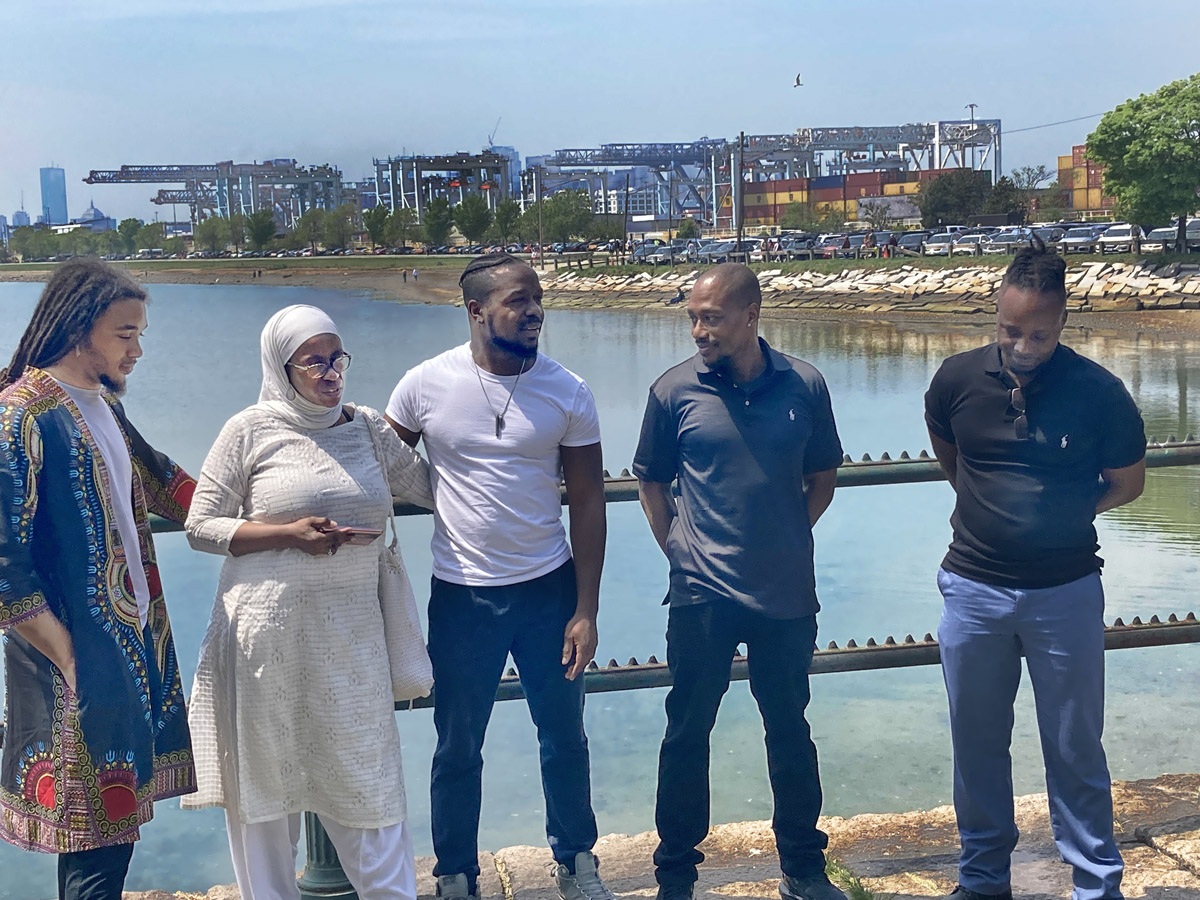
Idi Jawarakim’s children, from the left: Aaron, Luciana, Abel, Sharif, and Kamau on Castle Island, Boston, during his memorial on May 21, 2022.
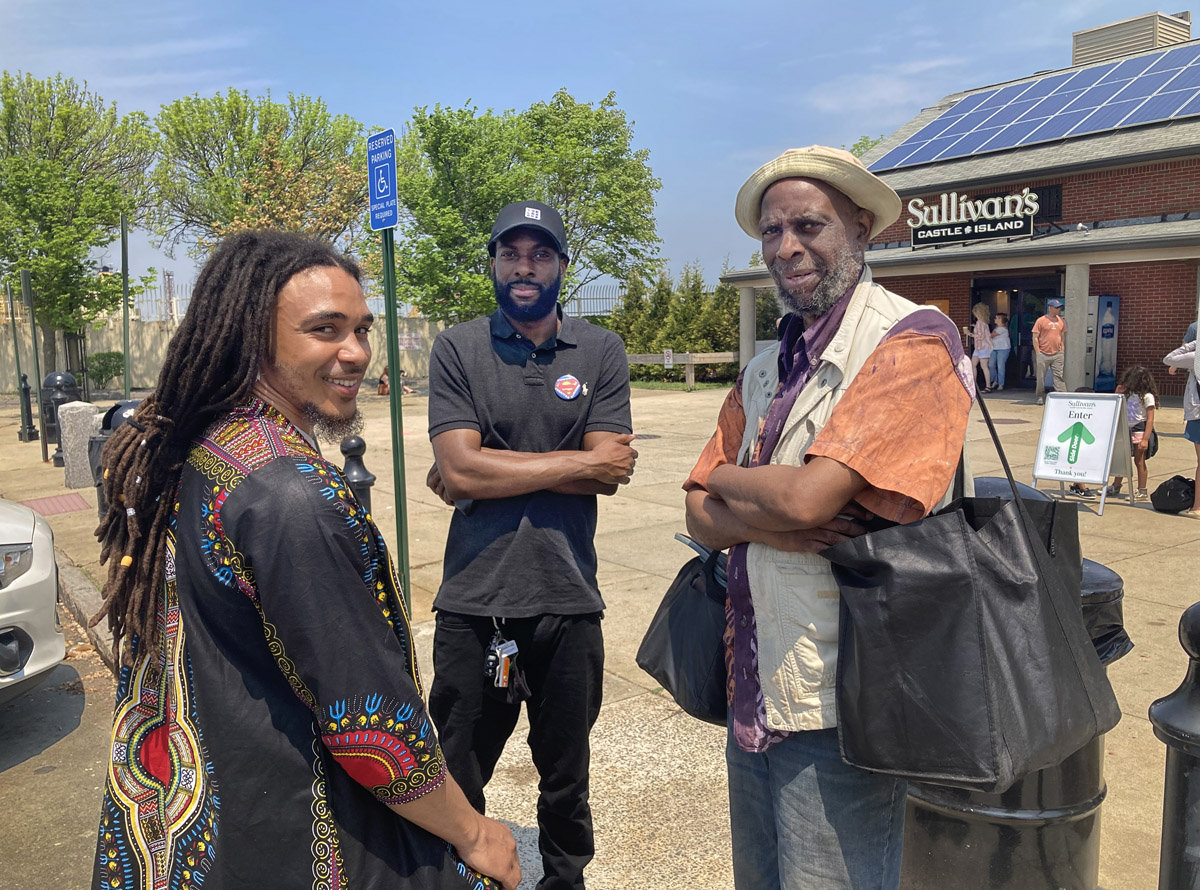
From the right: Brother Rumas and his son, and Idi’s son Aaron.
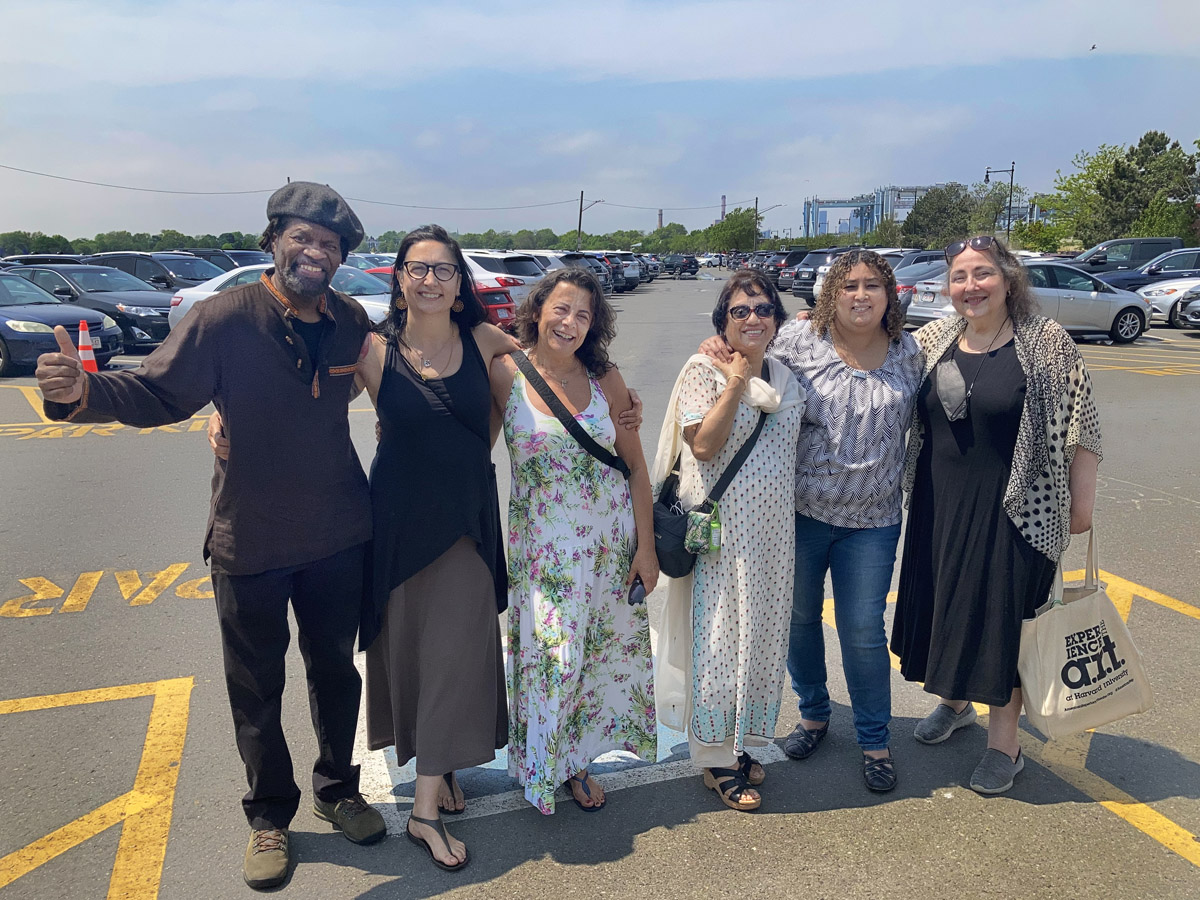
Idi’s friends and coworkers, from the left: Eddy, Isabel, Mary, Feroza, Atika and Jill.
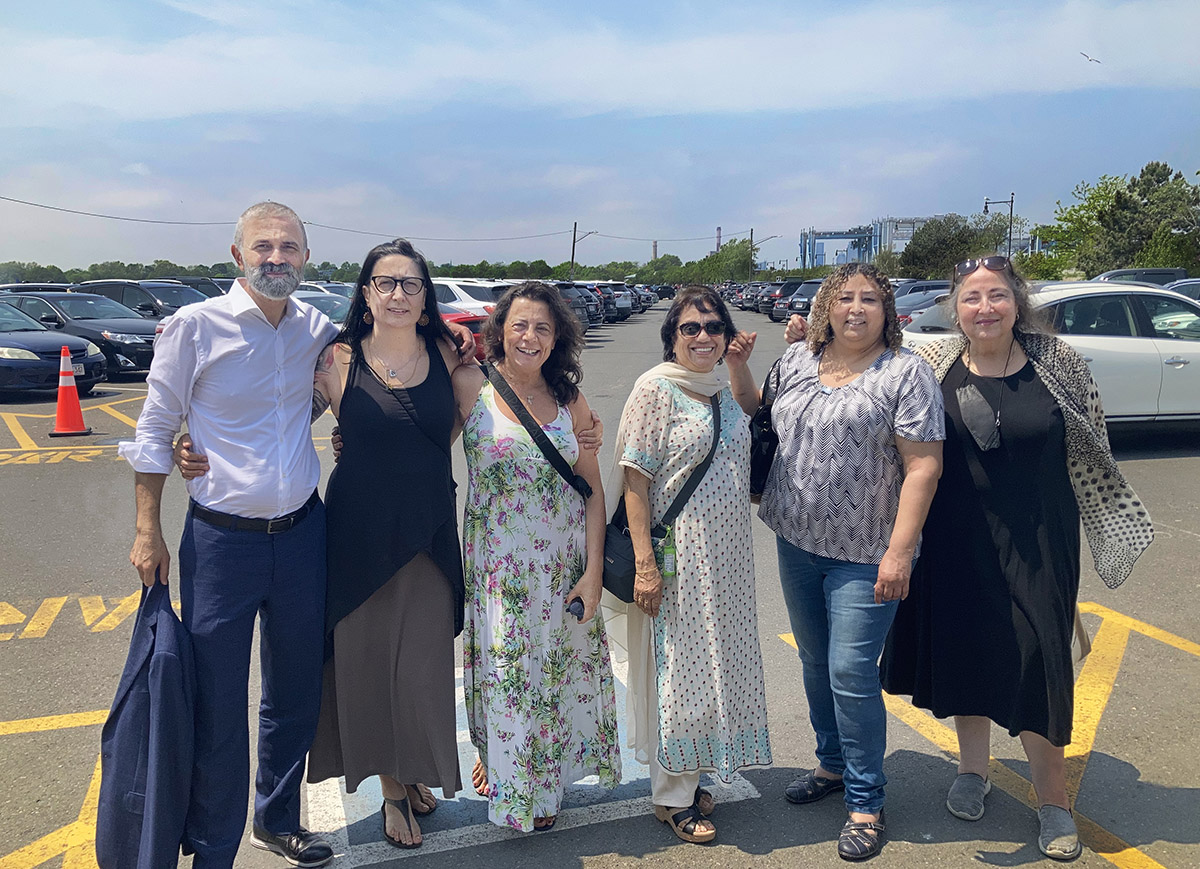
Idi’s friends and coworkers, from the left: Cem, Isabel, Mary, Feroza, Atika and Jill.
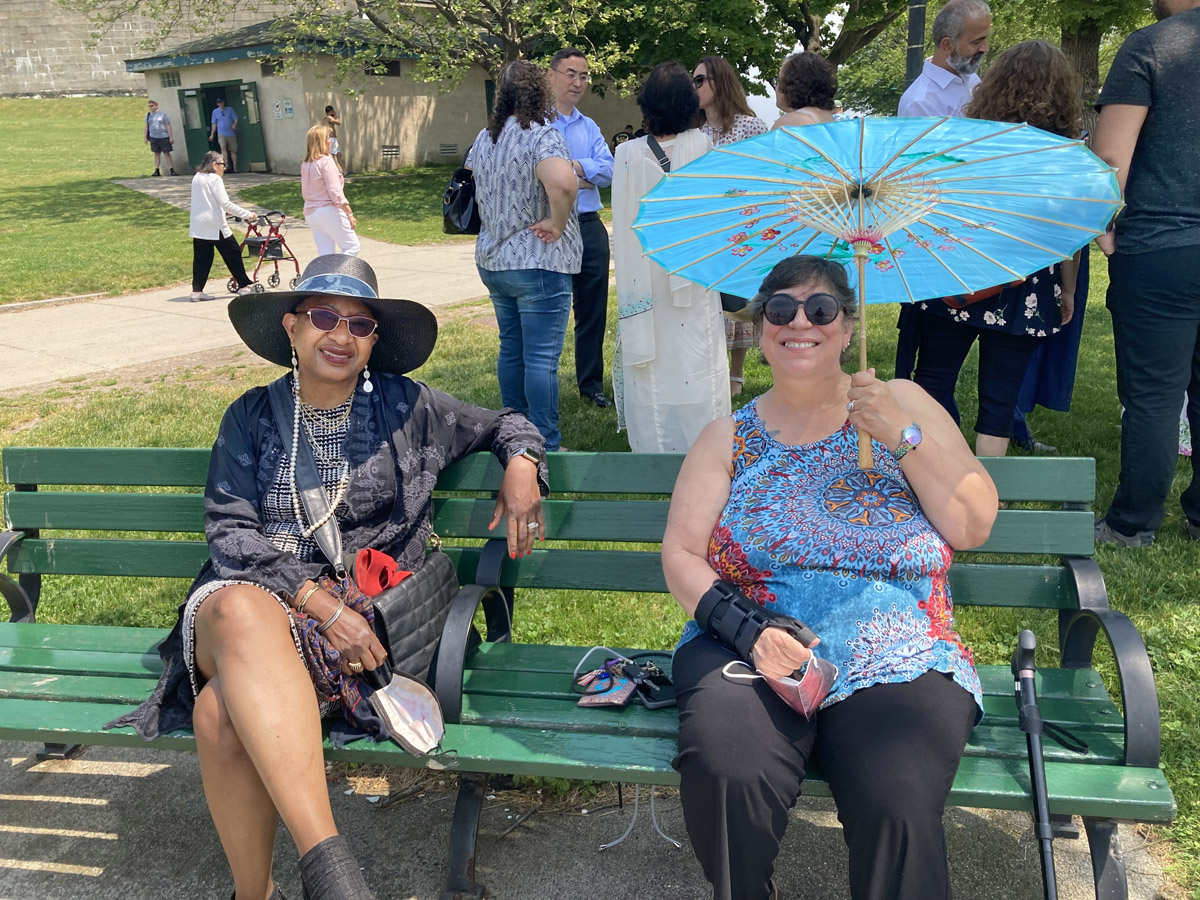
Idi’s friends and coworkers, from the left: Marie-Louise and Anita.
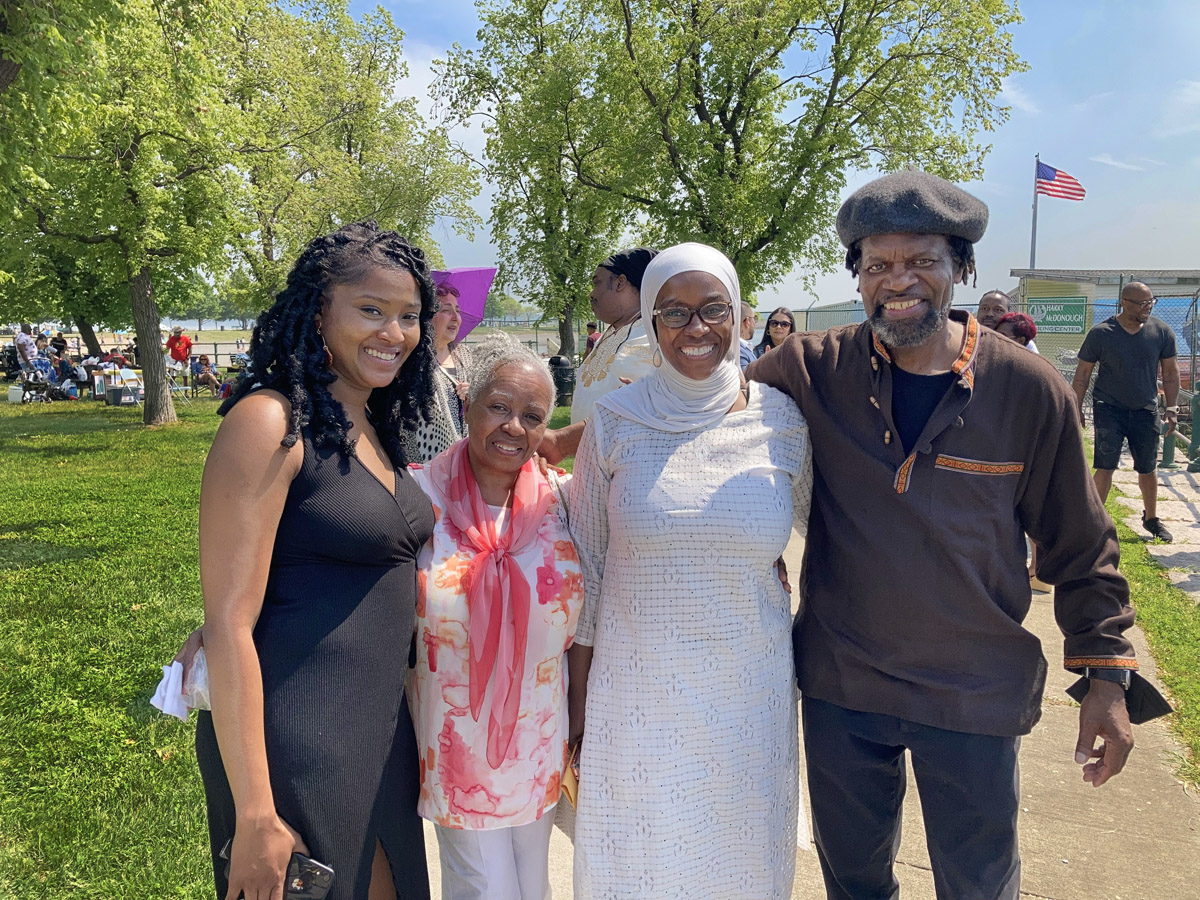
From the right: Idi’s friend Eddy and daughter Luciana with her mother and cousin.
Idi Jawarakim passed away April 30th 2022 in Rhode Island, due to Parkinson’s disease complications. He was a beautiful human being, the paragon of the community man. He was not only a great musician, but also an excellent poet; we used to refer to him back in the day as the “poet-musician.”
When I first met Idi Jawarakim in the early eighties, I was attracted to the profound humanism which seemed to guide his life’s impulses and praxes. He rejected totally the bourgeois social order and the Judeo-Christian moral principles that everyone violated and which animated a good proportion of the Haitian people; he had the same disdain for the conformist social milieus in the United States. Although a proud Haitian, he immersed himself in the life of US society, making friends in all ethnic, racial and social groups.
Idi spent more than 20 years working in the Cambridge Hospital as a Haitian and French interpreter. He was a venerated figure at the hospital, beloved by the patients, the providers and his colleagues in the MAPS department. He saw his role more than just a translator of linguistic exchanges between patient and caregiver, but equally as a cultural broker, a social defender, an advisor and a comforter. Doctors and providers who were dealing with difficult and recalcitrant patients would often call on him to help soften the obstacles to communication. Thanks to his experience and profound knowledge of the Haitian culture, Idi could discern that certain problems behind the complaints of a patient might have more to do with socioeconomic stressors than a biological malady, and that while doctors can treat the biological affliction, he could tell that other needs of the patient would have to be addressed as well.
Idi loved the fact that he was in the service of the community. That was his gratification. Even when the first phase of his illness compelled him to think more about his personal situation, he continued to help the CHA patients at Cambridge Hospital.
Knowing that the Parkinson illness might prevent Idi from talking about himself, about who he was and what he represented, I dedicated a chapter of my last book, Tyaka Poetica, to Idi Jawarakim, in order to share with new generations the experience I had with him and the wonderful human being that he was. (Unfortunately this chapter, published again in the edition of Tanbou, is written in Haitian and has not been translated at this moment.)
In the liner notes of his 2003 CD, “The Pugilist”, Idi enclosed the following dedication: “To all my children: Pascale, Luciana, Sharif, Kamau, Musa, Damali, Aaron, and Imamou.” Then he told them never to join anyone’s war. He also dedicated the songs to his wife DeAnn, and to many of his colleagues at Cambridge Health Alliance and friends in the community.
At the very end of the CD’s liner notes, Idi inserted a sentence (like Abbie Hoffman who titled his book in 1970s Steal This Book): “If you really cannot afford the $5 cover price for this demo CD—like many of my friends—I give you permission to make a copy and enjoy it with other people.” A sentence very Idiesque. Idi will be greatly missed.
On an unseasonably warm Saturday, May 21st 2022, Idi Jawarakim’s children, family members, friends, and former colleagues joined together on Castle Island in South Boston to scatter his ashes and to pay their last respects to him. It was a simple encounter of people who loved Idi. No, it was not a ceremony, just a gathering, a joining together in Nature to celebrate his life, as his son Abel said.
Idi’s children who addressed the good-sized crowd—Luciana, Sharif, Abel and Kamau—spun the legend of a man who approached his living among them with authenticity, simplicity, sometimes elemental routine, like when Sharif recalled how Idi would call him on his birthday every year, before 7 am, to wish him well. Luciana spoke of her deep love for her dad, “my giant,” and she read a poem she wrote to transfer to the eternal sphere the special tie that bound them. Twins Abel and Kamau exchanged jovial anecdotes and talked with profuse emotions of their last moments with their father. Idi’s son Aaron stood with his siblings, offering and receiving love and support.
When it was my turn to speak, I reminisced about Idi’s life, our enduring friendship, and his time at Cambridge Hospital where patients, until today, continue to ask for him, recounting how great and caring he was when working with them.
I read aloud parts of his poem «Men sa m vle» (“Here’s What I Want”) written in 1999, including these lines:
I would like to depart just as I came
Without hat without shoes without ceremony
Allow me one last pleasure when everything is over
Please, may a good Samaritan bury me naked
This is what I want.
I wondered why the family chose cremation, in seeming contradiction of Idi’s wish to be buried as expressed in the last stanza of this poem. The explanation, his brother Simon told me, is that Idi’s thoughts on cremation had evolved after Simon told him that the fire of Saint Peter’s Hell is way hotter than the fire on Earth. And they both laughed at this atypical metaphor!
Numerous guests came up to speak of a humble, strongly charismatic man, animated by his connection with all people. One CHA colleague, his friend and former supervisor Avlot Quessa, spoke of Idi’s influence on his becoming a business person who cares as much about his connection with people as about the bottom line. Jean Adam, a former colleague at the interpreters’ office, recalled Idi’s easy-going demeanour and his deep empathy for the patients he served. He said Idi would give patients his own money if he deemed that would reduce their hardship. Another CHA colleague, Sussen Gazal, read a poem she wrote lamenting his retirement from CHA a few years earlier.
Dr. Marie-Louise Jean-Baptiste related the experience of inviting Idi to teach a class on her behalf at Harvard Medical School, and how, when she tried to pay him for the service after doing such a good job, Idi adamantly refused, saying he was already gratified by being there to help educate others.
Jill Netchinsky sang an acapella version of Holly Near’s “The Great Peace March”, a song she performed in the past with Idi on the guitar, including at her engagement party with this writer. She encouraged all to join in the chorus.
Idi’s friend and fellow musician, Brother Rumas, shared with the mourning audience the good moments he spent with Idi, telling us how the latter inspired his healthy eating habit. He distributed muffins he had prepared using Idi’s health-conscious vegan culinary principles, and encouraged us all to partake.
Besides those former colleagues already cited, also present were Idi’s long-time friends at the medical interpretation department including Isabel Franco, Atika Kouhail, Feroza Bashar, Gabriela Crinigan, Leonardo Toppin and his family, Anita Y. Coelho, Kelly Wotkosky, Alysson Luiz Bastos, Anna Maria Rios, Natalie Syrion, Markus Robelo, Mary De Melo, Christmene Goin, Yilu Ma, and many others. Among the family members were many nieces, nephews, grand-nieces, his step-son Gandhi, and mothers of his children. Many long-time friends and acquaintances from the Greater Bosto Haitian community were there as well, including Nekita Lamour, Daniel Laurent, Rubens, Alix Siméon, and others.
It was a sunny and beautiful day on Boston’s Castle Island on that Saturday May 21st 2022. Nature seemed to have set purposely the scene to honor the departure of this wonderful man that she had ever nurtured in her breast.
The memorial ambiance at Castle Island was altogether mournful, amiable, surreal, joyful, and in keeping with Idi’s embrace of a Glissantian poetics of relation in a social universe where many worlds join in unison to create unity and beauty.
Idi Jawarakim will be missed for the unique generosity, spirit, and beauty he brought to us all. Idi Jawarakim, PRÉSENTE!
—Eddy Toussaint Tontongi May 24, 2022
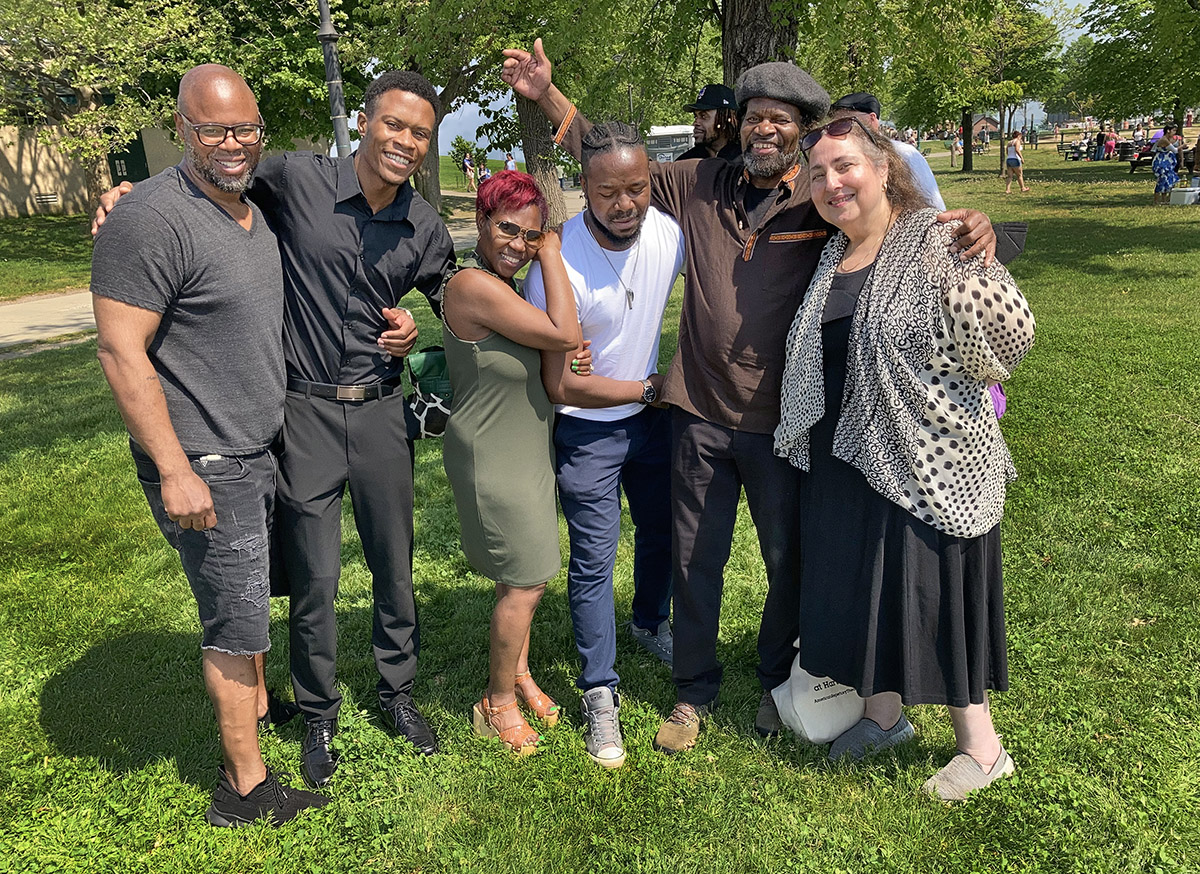
From the right: Idi’s friends Jill and Eddy with his son, niece and nephews on Castle Island, Boston, during Idi’s memorial on May 21, 2022.
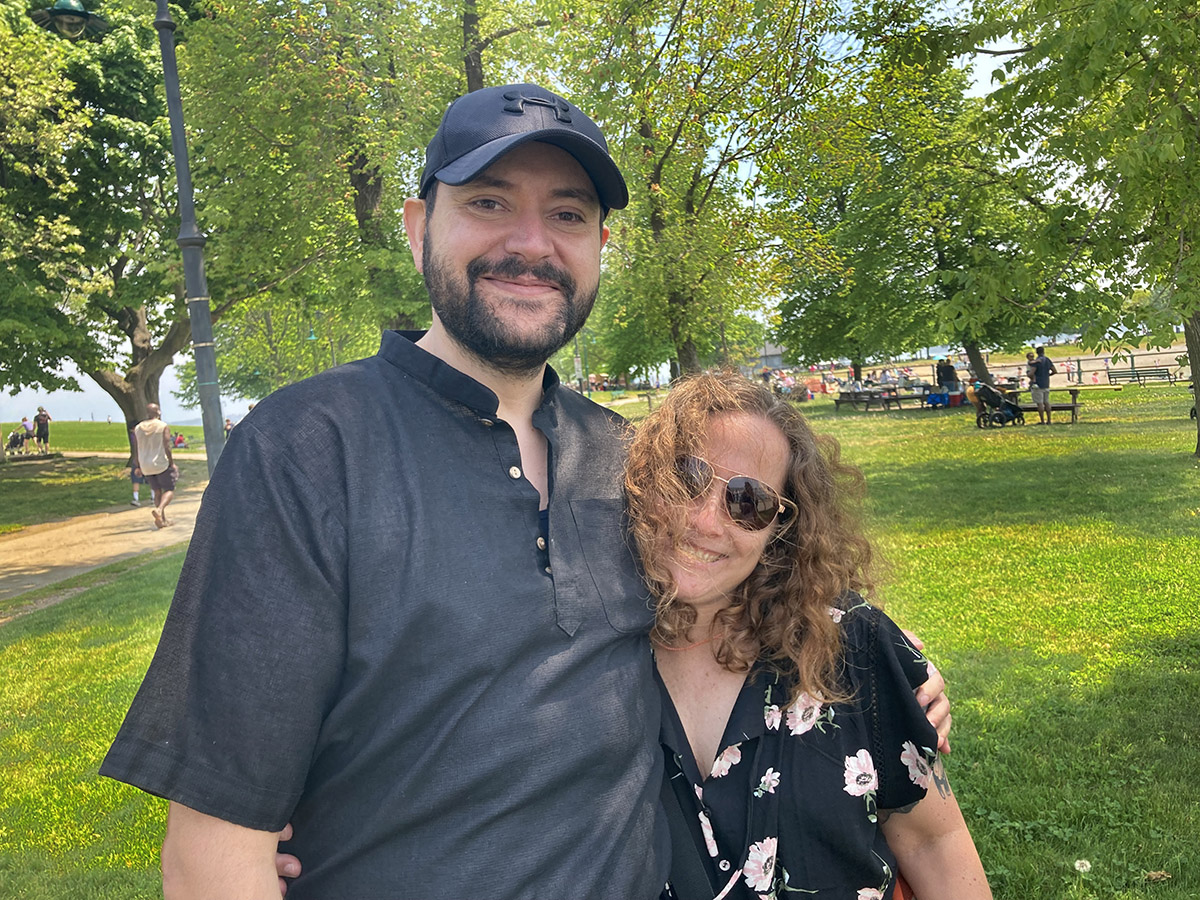
From the right: Idi’s friends Gabriela and Markus.
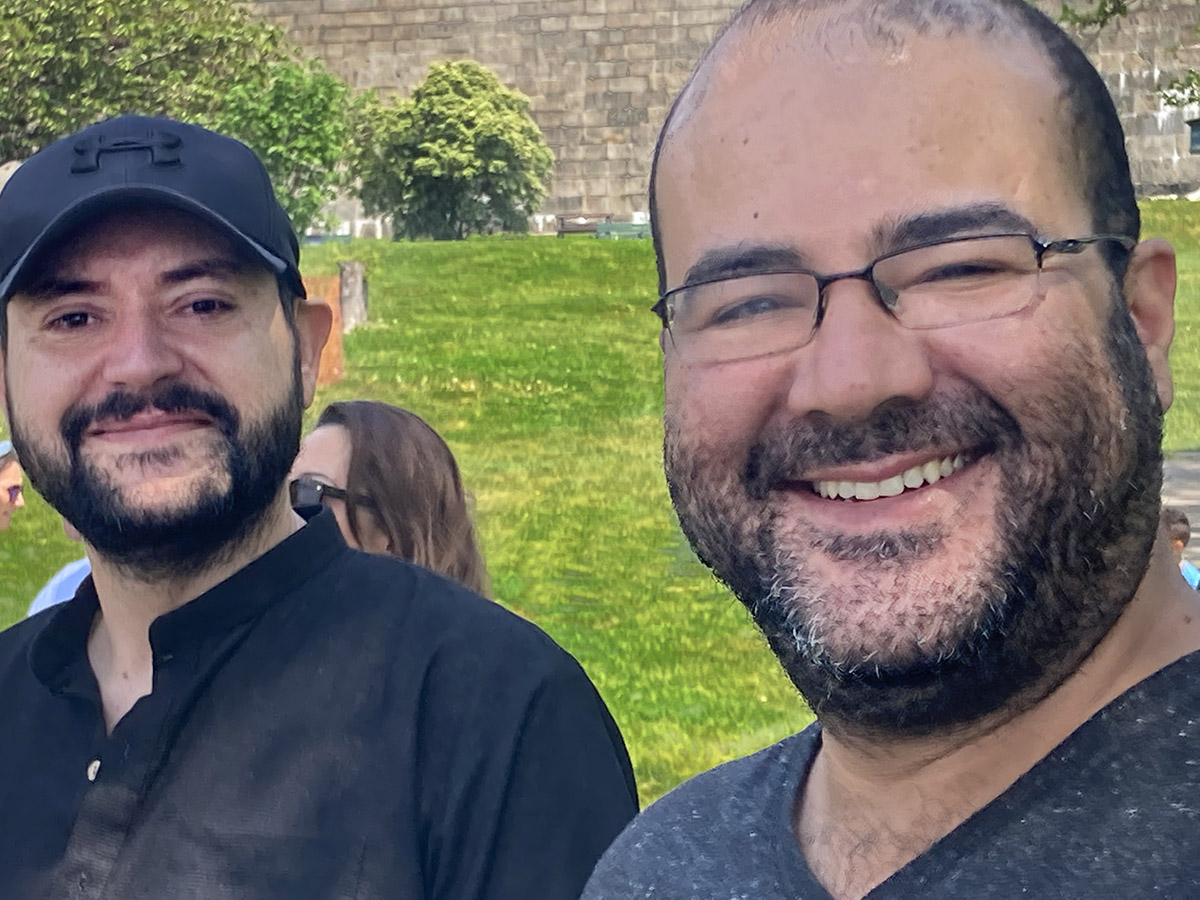
From the right: Idi’s friends Alysson and Markus.
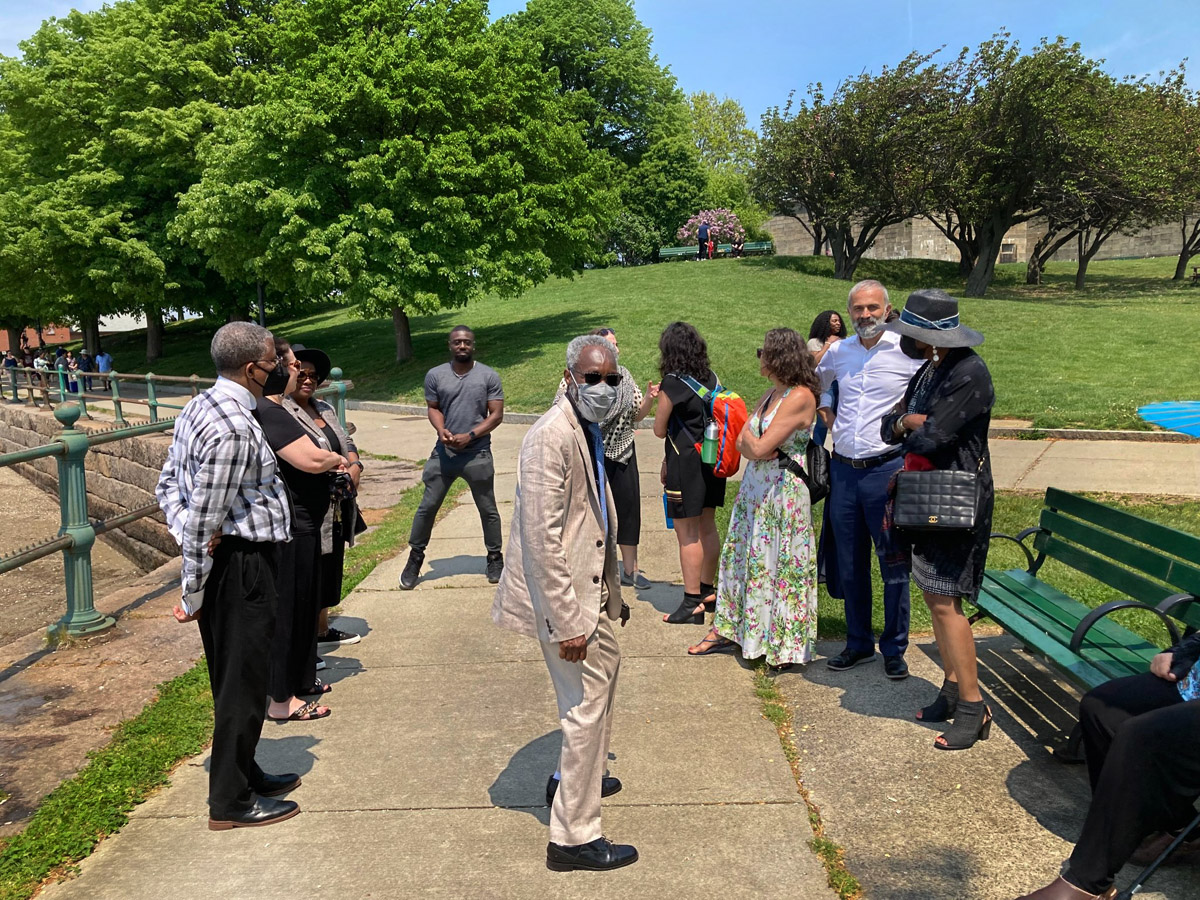
From the left: Idi’s friends and coworkers: Jean, Natalie, Alix, Sussen, Marie-Louise, Marie, and others.
